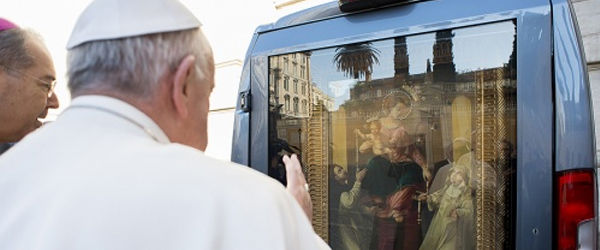As international leaders increasingly discussed the possibility of some form of armed intervention in Syria, the Vatican said Pope Francis would interrupt the last week of his summer break in order to meet Aug. 29 with Jordan's King Abdullah II.Jordan and Syria share a border, and Jordan is hosting some 500,000 Syrian refugees.Both the pope and the king have repeatedly called for the international community to help broker a negotiated end to the fighting in Syria."It is not clashes, but an ability to meet and to dialogue that offers prospects for a hope of resolving the problems," the pope said Aug. 25 after reciting the Angelus with visitors in St. Peter's Square.Pope Francis also denounced the "multiplication of massacres and atrocious acts," including the suspected chemical weapons attack that left hundreds dead.After several days of delay, supposedly for their protection, the Syrian government gave U.N. weapons inspectors permission to visit the site, but the inspectors had to turn back to their hotel Aug. 26 after their vehicles were fired upon. The Syrian government blamed the rebels, and the rebels blamed government forces.British Prime Minister David Cameron called lawmakers back to London to discuss possible responses to the chemical attack.Canada's Foreign Minister John Baird described the alleged chemical weapons attack as a "dark new chapter" in the Syrian crisis, but he told reporters Aug. 26 that the Canadian government "believes the only way to halt the bloodshed in Syria is through a political solution."Alexander Lukashevich, the foreign minister of Russia, an ally of Syria, said in a statement Aug. 27 that military action without the approval of the U.N. Security Council would lead to "new suffering in Syria and catastrophic consequences for other countries of the Middle East and North Africa."In his Aug. 25 Angelus address, Pope Francis said the "terrible images" of the dead, including children, "push me once again to raise a voice so that the roar of the weapons would stop." Once again the pope asked the crowd to join him in praying that Mary, queen of peace, would intercede to stop the fighting that has raged in Syria since March 2011 as rebels try to oust Syrian President Bashar Assad. "From the depths of my heart, I want to express my closeness in prayer and solidarity with all the victims of this conflict (and) all those who are suffering, especially the children, and ask them to keep their hopes for peace alive," the pope said. He asked the international community to pay more attention to the conflict in Syria and help the nation's people "find a solution to this war that is sowing destruction and death." Archbishop Mario Zenari, the Vatican nuncio to Syria, told Vatican Radio Aug. 25 that looking at the images of the alleged chemical attack, "I hear the cry of these children, these innocent victims." At the same time, he said he prayed that the leaders of both sides in the conflict as well as leaders in the international community "would be gifted with much wisdom and much prudence" as they decide how to move forward. "We must do so in a way that these crimes, these massacres never happen again," the archbishop said. "We must find the most appropriate and opportune means to react, ways that will not complicate the situation." Chaldean Catholic Bishop Antoine Audo of Aleppo told Vatican Radio Aug. 26 that Pope Francis was calling for a real commitment by the international community to encourage dialogue and negotiations in Syria. "If there were a military intervention, I think this would lead to a world war," the bishop said. "There is this risk. "Let's hope that the pope's appeal will promote a real dialogue between the parties in conflict. The objective must not be more fighting, but acting so that "the people will be free to move around, travel, communicate (and) work. This is what we hope for: An international effort that will help dialogue and not make war.”—CNS{gallery width=100 height=100}gallery/2013/0830/popesyria/{/gallery}

